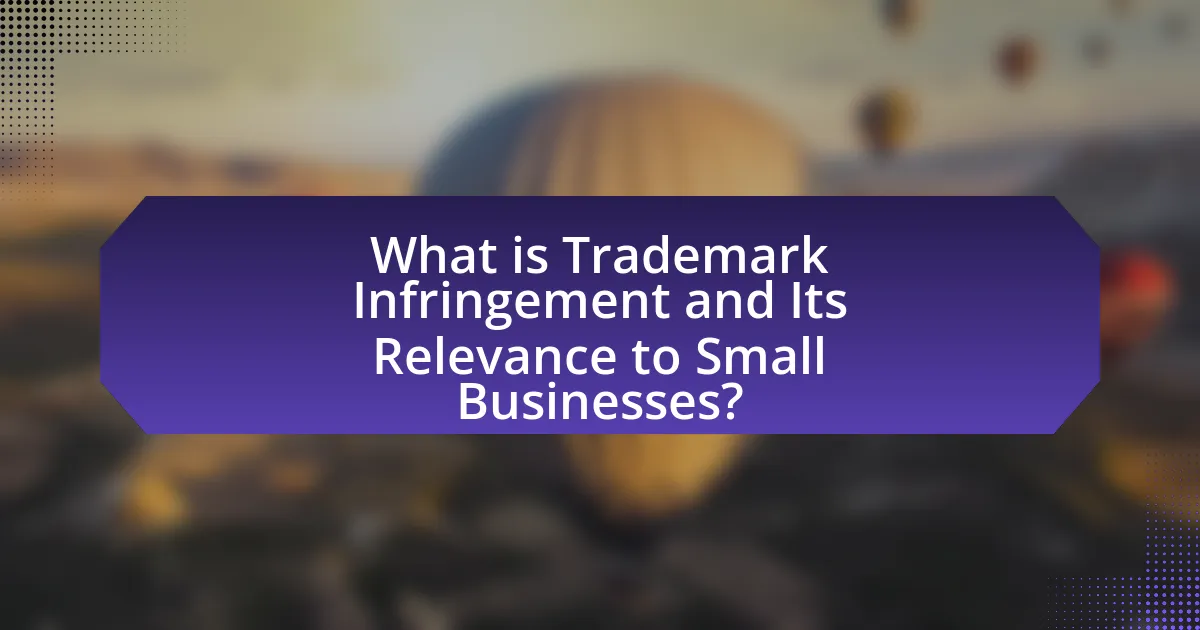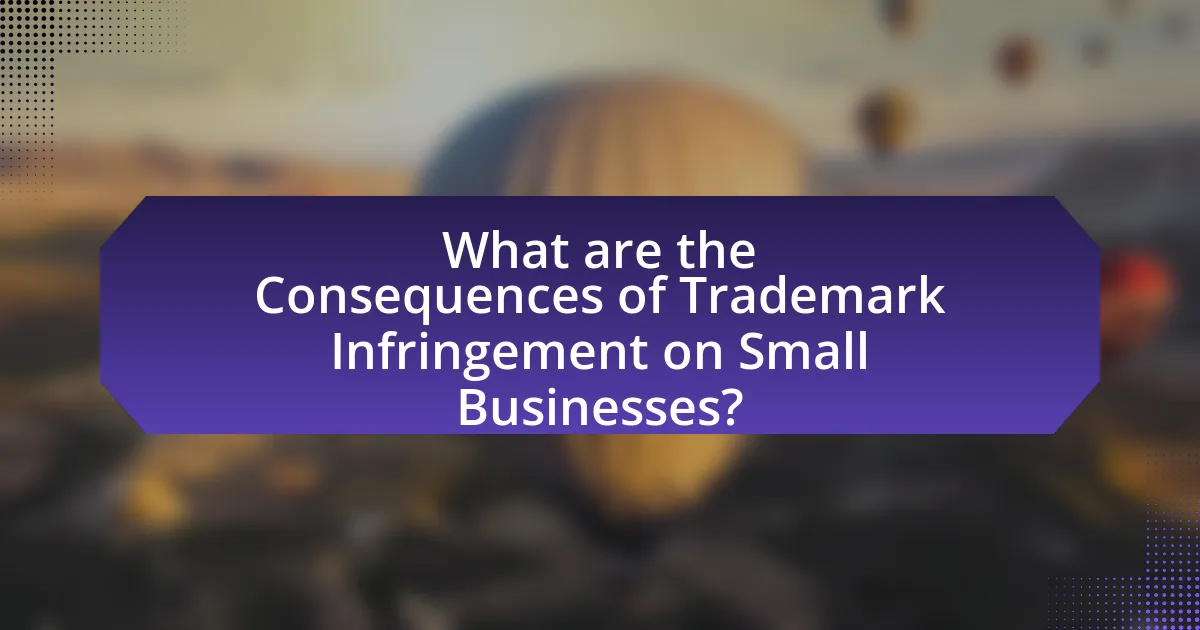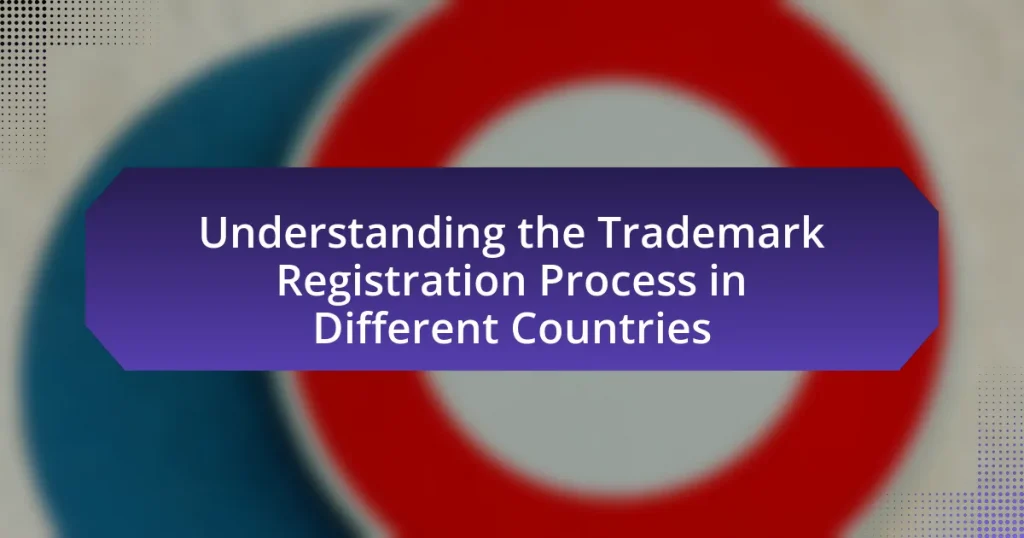Trademark infringement is defined as the unauthorized use of a trademark that is identical or confusingly similar to a registered trademark, leading to consumer confusion regarding the source of goods or services. This issue is particularly significant for small businesses, which often depend on their brand identity for market differentiation but face higher risks due to limited resources for legal protection. The article explores how trademark infringement occurs, its common forms, and the legal implications for small businesses, including financial repercussions and damage to brand reputation. It also discusses strategies for small businesses to protect themselves against infringement, the importance of trademark registration, and available resources for legal assistance.

What is Trademark Infringement and Its Relevance to Small Businesses?
Trademark infringement occurs when a party uses a trademark that is identical or confusingly similar to a registered trademark owned by another party, leading to consumer confusion about the source of goods or services. This is particularly relevant to small businesses because they often rely on their brand identity to differentiate themselves in the market. According to the U.S. Patent and Trademark Office, small businesses are at a higher risk of infringement due to limited resources for legal protection and brand management. Infringement can result in costly legal battles, loss of customer trust, and potential damage to a small business’s reputation, making it crucial for them to understand and protect their trademarks effectively.
How does trademark infringement occur in the context of small businesses?
Trademark infringement occurs in the context of small businesses when a company uses a trademark that is identical or confusingly similar to a registered trademark owned by another entity, leading to consumer confusion. This can happen through various means, such as using a similar brand name, logo, or product packaging that misleads consumers into believing there is an affiliation or endorsement by the trademark owner. For instance, a small business may inadvertently adopt a name that resembles a well-known brand, resulting in legal action from the trademark holder. According to the United States Patent and Trademark Office, trademark infringement can lead to significant financial repercussions, including damages and loss of business reputation for the infringing party.
What are the common forms of trademark infringement affecting small businesses?
Common forms of trademark infringement affecting small businesses include counterfeiting, trademark dilution, and unauthorized use of trademarks. Counterfeiting occurs when a business produces fake goods that bear a registered trademark, misleading consumers about the product’s origin. Trademark dilution happens when a trademark’s distinctiveness is weakened through unauthorized use, even if there is no direct competition. Unauthorized use involves using a trademark without permission, which can confuse consumers and harm the original brand’s reputation. These forms of infringement can lead to significant financial losses and legal challenges for small businesses, as they often lack the resources to combat such violations effectively.
How can small businesses identify potential trademark infringement?
Small businesses can identify potential trademark infringement by conducting thorough searches of existing trademarks and monitoring the marketplace for similar brands. This involves utilizing databases such as the United States Patent and Trademark Office (USPTO) to check for registered trademarks that may conflict with their own. Additionally, small businesses should regularly review competitors’ branding and marketing materials to spot any similarities that could lead to confusion among consumers. Research indicates that approximately 50% of small businesses face trademark disputes, highlighting the importance of proactive measures in trademark monitoring.
Why is trademark protection important for small businesses?
Trademark protection is crucial for small businesses because it safeguards their brand identity and prevents unauthorized use by competitors. By securing a trademark, small businesses can establish a unique presence in the market, which helps in building customer loyalty and trust. According to the United States Patent and Trademark Office, trademarks can increase a business’s value and provide legal recourse against infringement, thereby protecting the business’s reputation and financial investment. This legal protection is essential for small businesses to compete effectively and maintain their market position.
What are the legal implications of trademark infringement for small businesses?
Trademark infringement can lead to significant legal consequences for small businesses, including monetary damages, injunctions, and loss of brand reputation. When a small business infringes on a trademark, the trademark owner can sue for damages, which may include actual damages, lost profits, and statutory damages that can range from hundreds to millions of dollars, depending on the case. Additionally, courts may issue injunctions that prevent the infringing business from using the trademark, which can disrupt operations and lead to further financial losses. Furthermore, small businesses may face legal fees and costs associated with defending against infringement claims, which can be particularly burdensome given their limited resources. The legal framework governing trademark infringement is outlined in the Lanham Act, which provides the basis for trademark protection and enforcement in the United States.
How does trademark infringement impact a small business’s brand reputation?
Trademark infringement significantly damages a small business’s brand reputation by creating confusion among consumers regarding the source of products or services. This confusion can lead to a loss of customer trust, as consumers may associate the infringing brand with lower quality or unethical practices. According to a study by the International Trademark Association, 74% of consumers reported that they would avoid purchasing from a brand that they believed was involved in trademark infringement. Consequently, the small business may experience decreased sales, diminished customer loyalty, and a tarnished public image, all of which can hinder its growth and sustainability in a competitive market.

What are the Consequences of Trademark Infringement on Small Businesses?
Trademark infringement can lead to severe financial and reputational consequences for small businesses. Financially, small businesses may face costly legal battles, which can drain resources and lead to bankruptcy; for instance, a study by the International Trademark Association found that small businesses spend an average of $100,000 on legal fees related to trademark disputes. Reputationally, being associated with infringement can damage customer trust and brand integrity, resulting in lost sales and diminished market presence. Additionally, small businesses may be forced to cease operations or rebrand, incurring further costs and operational disruptions.
How does trademark infringement affect the financial stability of small businesses?
Trademark infringement significantly undermines the financial stability of small businesses by leading to lost revenue, increased legal costs, and damage to brand reputation. When a small business’s trademark is infringed upon, it may experience a decline in customer trust and loyalty, which directly impacts sales. According to a study by the International Trademark Association, 70% of small businesses reported that trademark infringement negatively affected their revenue. Additionally, the costs associated with legal battles to protect trademarks can be substantial, often exceeding the financial resources of small businesses. This combination of lost income and increased expenses can jeopardize their overall financial health and sustainability.
What are the potential costs associated with legal battles over trademark infringement?
Legal battles over trademark infringement can incur significant costs, including attorney fees, court costs, and potential damages awarded to the prevailing party. Attorney fees can range from $150 to $1,000 per hour, depending on the complexity of the case and the experience of the lawyer. Court costs, including filing fees and other administrative expenses, can add thousands of dollars to the total. Additionally, if a business loses a trademark infringement case, it may be liable for damages, which can include actual damages, lost profits, and in some cases, statutory damages that can reach up to $2 million for willful infringement. These financial burdens can severely impact small businesses, potentially leading to bankruptcy or closure.
How can trademark infringement lead to loss of customer trust?
Trademark infringement can lead to a significant loss of customer trust because it creates confusion about the authenticity and quality of products. When consumers encounter counterfeit or misleadingly similar goods, they may associate negative experiences with the original brand, believing that the brand has compromised its standards. Research indicates that 70% of consumers are less likely to purchase from a brand if they have encountered counterfeit products associated with it, highlighting the direct correlation between infringement and diminished trust. This erosion of trust can severely impact small businesses, as they rely heavily on brand reputation to attract and retain customers.
What are the operational impacts of trademark infringement on small businesses?
Trademark infringement negatively affects small businesses by causing financial losses, damaging brand reputation, and diverting resources. Financially, small businesses may face costly legal battles to defend their trademarks, which can strain limited budgets. Additionally, if consumers confuse their products with those of infringers, sales can decline, leading to reduced revenue. Brand reputation suffers as customers may associate the business with inferior or counterfeit products, eroding trust. Furthermore, small businesses often have to allocate time and resources to address infringement issues instead of focusing on growth and innovation, hindering operational efficiency. These impacts collectively threaten the sustainability and competitiveness of small businesses in the market.
How does trademark infringement disrupt business operations?
Trademark infringement disrupts business operations by causing financial losses, damaging brand reputation, and diverting resources to legal disputes. Financially, businesses may face decreased sales due to consumer confusion or loss of market share, as evidenced by a study from the International Trademark Association, which found that 70% of businesses reported a negative financial impact from trademark infringement. Additionally, the damage to brand reputation can lead to a loss of customer trust, further exacerbating financial issues. Resources are also diverted as companies must allocate time and money to legal battles, which can hinder growth and innovation.
What are the long-term effects of trademark infringement on business growth?
Trademark infringement can severely hinder business growth over the long term by damaging brand reputation and customer trust. When a business’s trademark is infringed, it can lead to confusion among consumers, resulting in lost sales and diminished market share. A study by the International Trademark Association found that 75% of consumers are less likely to purchase from a brand that they perceive as having a weak trademark, indicating that infringement can directly impact consumer perception and loyalty. Additionally, legal battles arising from trademark disputes can divert resources and focus away from core business activities, stunting innovation and expansion efforts. Ultimately, the cumulative effects of these factors can lead to a significant decline in profitability and market position for the affected business.

How Can Small Businesses Protect Themselves Against Trademark Infringement?
Small businesses can protect themselves against trademark infringement by registering their trademarks with the United States Patent and Trademark Office (USPTO) to establish legal ownership and gain exclusive rights. This registration provides a public record of the trademark, making it easier to enforce rights against infringers. Additionally, small businesses should conduct thorough trademark searches before launching new products or services to ensure that their trademarks do not conflict with existing ones. Monitoring the market for potential infringements and sending cease-and-desist letters when necessary can also help protect their brand. According to the USPTO, registered trademarks can significantly enhance a business’s ability to defend against infringement claims, as they provide legal presumptions of ownership and validity.
What proactive measures can small businesses take to avoid trademark infringement?
Small businesses can avoid trademark infringement by conducting thorough trademark searches before adopting any brand names or logos. This proactive measure ensures that the chosen identifiers do not conflict with existing trademarks, reducing the risk of legal disputes. According to the United States Patent and Trademark Office, conducting a comprehensive search can reveal potential conflicts and help businesses make informed decisions about their branding. Additionally, small businesses should consider registering their trademarks, as this provides legal protection and strengthens their claim against infringement. Regularly monitoring the market for similar trademarks and educating employees about trademark laws further enhances a business’s ability to avoid infringement.
How can small businesses conduct trademark searches effectively?
Small businesses can conduct trademark searches effectively by utilizing the United States Patent and Trademark Office (USPTO) database and other online resources. The USPTO provides a comprehensive search tool called the Trademark Electronic Search System (TESS), which allows users to search for existing trademarks by name, owner, or registration number. Additionally, businesses should consider searching state trademark databases and conducting general internet searches to identify potential conflicts. According to the USPTO, conducting thorough searches can help prevent costly legal disputes and ensure that a business can secure its brand identity without infringing on existing trademarks.
What role does legal counsel play in trademark protection for small businesses?
Legal counsel plays a crucial role in trademark protection for small businesses by providing expert guidance on trademark registration, enforcement, and compliance. They assist small businesses in navigating the complexities of trademark law, ensuring that trademarks are properly registered with the United States Patent and Trademark Office (USPTO) or relevant authorities, which is essential for legal protection. Furthermore, legal counsel helps in conducting trademark searches to identify potential conflicts and advising on strategies to avoid infringement. According to the USPTO, businesses that register their trademarks gain significant legal advantages, including the presumption of ownership and exclusive rights to use the mark in commerce. This legal support is vital for small businesses to safeguard their brand identity and mitigate the risks associated with trademark infringement.
What strategies can small businesses implement if they face trademark infringement?
Small businesses facing trademark infringement can implement several strategies to protect their rights and mitigate damages. First, they should conduct a thorough investigation to gather evidence of the infringement, which includes documenting instances of unauthorized use and collecting relevant materials. This evidence is crucial for any legal action or negotiation.
Next, small businesses should consider sending a cease-and-desist letter to the infringing party, clearly outlining the trademark rights and demanding that the infringement stop. This letter serves as a formal notice and can often resolve the issue without further legal action.
Additionally, small businesses may seek legal counsel to explore options for filing a lawsuit if the infringement continues. Legal action can lead to remedies such as injunctions to stop the infringing activity and potential monetary damages.
Moreover, small businesses can strengthen their trademark protection by registering their trademarks with the United States Patent and Trademark Office (USPTO) or relevant authorities in their jurisdiction. Registration provides legal advantages and enhances the ability to enforce trademark rights.
Finally, small businesses should engage in proactive brand monitoring to detect potential infringements early. This can involve using online tools or services that track the use of similar trademarks in the marketplace.
These strategies are supported by the fact that proactive measures and legal protections significantly increase the chances of successfully addressing trademark infringement, as evidenced by numerous cases where businesses have successfully defended their trademarks through these methods.
How should small businesses respond to a trademark infringement notice?
Small businesses should respond to a trademark infringement notice by promptly reviewing the claim and assessing its validity. This involves gathering relevant documentation, such as proof of trademark registration and evidence of use, to determine if the infringement is legitimate. If the claim is valid, the business should consider ceasing the infringing activity and seeking legal counsel to negotiate a resolution. According to the United States Patent and Trademark Office, timely and appropriate responses can mitigate potential legal consequences and protect the business’s interests.
What are the best practices for resolving trademark disputes?
The best practices for resolving trademark disputes include negotiation, mediation, and, if necessary, litigation. Negotiation allows the parties involved to communicate directly and seek a mutually agreeable solution, often preserving business relationships. Mediation involves a neutral third party who facilitates discussions and helps the parties reach a settlement, which can be less costly and time-consuming than litigation. If these methods fail, litigation may be pursued, where a court will make a binding decision based on trademark law. According to the American Bar Association, over 90% of trademark disputes are resolved before reaching trial, highlighting the effectiveness of negotiation and mediation as primary strategies.
What resources are available for small businesses dealing with trademark issues?
Small businesses dealing with trademark issues can access several resources, including the United States Patent and Trademark Office (USPTO), which provides guidance on trademark registration and protection. The USPTO offers online tools, educational materials, and a searchable database of registered trademarks, helping businesses understand their rights and navigate the application process. Additionally, organizations like the Small Business Administration (SBA) offer resources and workshops on intellectual property, including trademarks, to assist entrepreneurs in protecting their brands. Legal aid clinics and pro bono services also exist to provide small businesses with affordable legal advice regarding trademark disputes and enforcement.
How can small businesses access legal assistance for trademark matters?
Small businesses can access legal assistance for trademark matters through various avenues such as local bar associations, legal aid organizations, and online legal services. Local bar associations often provide referral services that connect small business owners with attorneys specializing in intellectual property law, including trademarks. Legal aid organizations may offer free or low-cost legal assistance to qualifying small businesses, helping them navigate trademark registration and enforcement. Additionally, online legal services like LegalZoom or Rocket Lawyer provide affordable options for trademark registration and legal advice, making it easier for small businesses to protect their intellectual property.
What organizations provide support for small businesses facing trademark challenges?
Organizations that provide support for small businesses facing trademark challenges include the United States Patent and Trademark Office (USPTO), the Small Business Administration (SBA), and the International Trademark Association (INTA). The USPTO offers resources and guidance on trademark registration and protection, while the SBA provides assistance through its network of Small Business Development Centers (SBDCs) that help businesses navigate legal issues, including trademarks. INTA advocates for trademark rights and offers educational resources to help small businesses understand and manage trademark challenges effectively.



